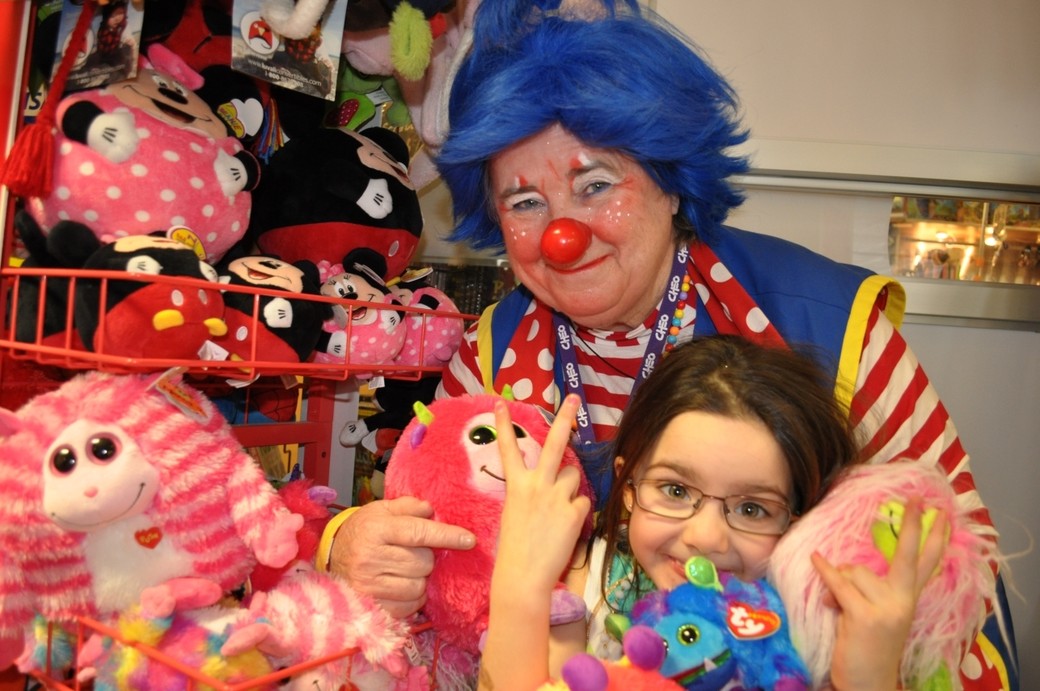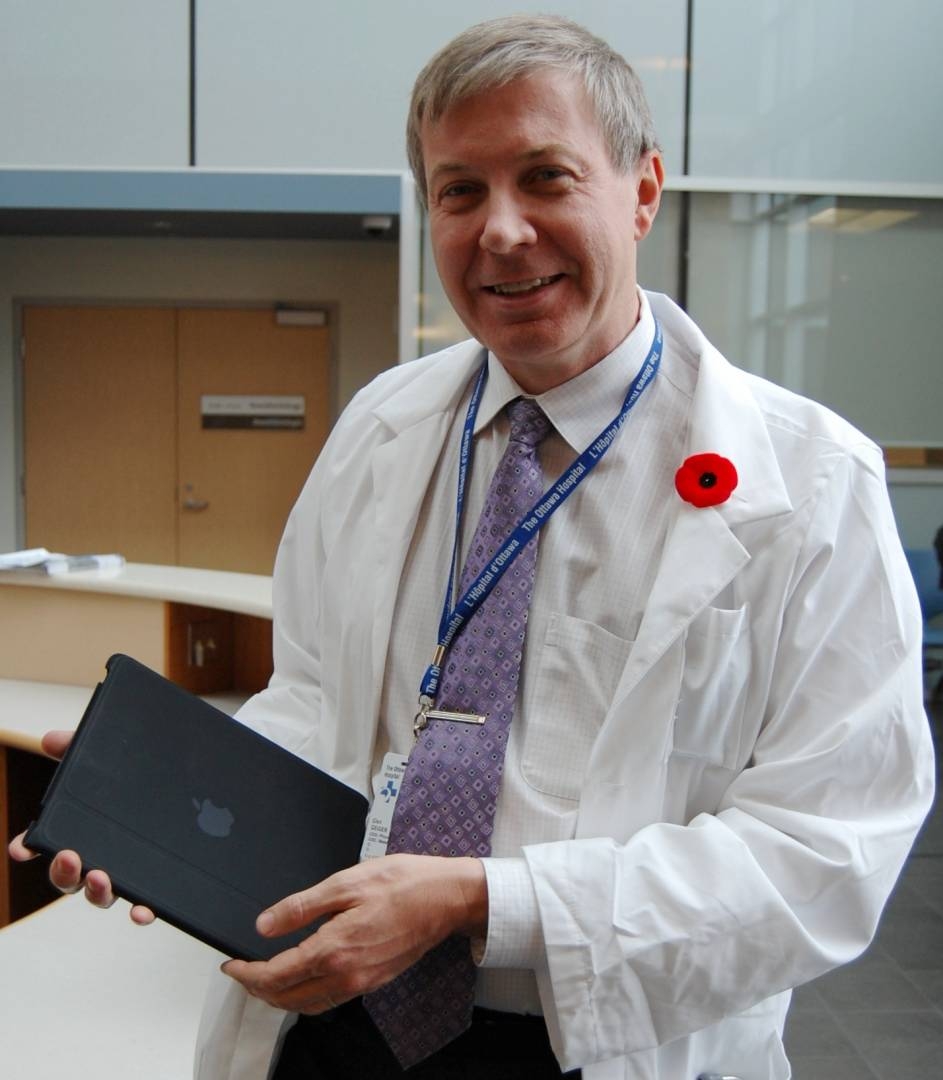
Imagine If the Whole World Played…
By Damira Davletyarova
At Children’s Hospital of Eastern Ontario (CHEO) everybody knows who is in charge of cheer and joy. Blue hair with a gawky ponytail on top, red nose, dressed in motley costume with big blunted boots, she is easily spotted in the hospital.
Here comes Mollypenny – a therapeutic clown at CHEO. Unlike circus clown, Molly is a part of the health care team. She is responsible for providing healing through laughter, play and magic. With gentle comedy and caring attitude, she comforts children and their parents in the somber atmosphere of a hospital setting.
When Molly walks through the hospital, no child is left short of her attention. Her mind is full of jokes, her pockets are full of stickers, her small sack contains enough tools to trick anyone.
“When I come into a waiting room and sit down, you can see everybody is on alert because something might happen,” the clown pauses, raising a finger, mischievously adds: “Sometimes, things do happen.”
Molly also has a record number of little friends who are always happy to see her. Five-year-old Hannah Mankal came with her mother Hoda Mankal to see a rheumatologist. They were sitting in the cafeteria when the clown surprised her old friend by joining them at their table.
Molly: Would you like a brownie for you and your mom?
The girl, shyly, yet with a smile on her face, says yes. Molly rummages through her 17 pockets and promptly pulls out a clenched fist placing it on the girl’s outstretched palms.
Hannah: They are not brownies.
Molly: What colour?
Hannah: (giggling) Brrrown
Molly: What letters?
The girl: Es.
Molly: So, they are brownEs.
Hannah: (already distracted from the trick): You look like a boy with twisted hair.
Molly: Twisted hair? But do you see a grey hair? I have only one grey hair.
The clown pulls out a grey hare made from foam. The girl and her mother start laughing. Afterwards, Hannah says she likes Molly. She says Molly is funny because the clown makes her laugh. Hannah starts retelling the clown’s trick.
clown’s trick.
“They are letter brownies, and then the letter E is brown,” Hannah says with a knowing face.
The girl’s mother thinks CHEO offers many wonderful programs targeted at child’s well-being, and the clowning is a special one. Mankal says Molly keeps the spirit of the hospital going.
“Just like that movie Patch Adams, she makes light of a hospital setting, when she lets them laugh and ask questions, feel safe and comfortable,” Mankal says. “Kids are raw, they wear their emotions on their sleeves, Molly just helps them put them into words.”
The mother of the girl admits: with time, she also became a fan of the blue-haired clown.
“I have been watching Molly interacting with Hannah, and I can’t help laughing a lot. Even if they don’t get her jokes, adults do,” Mankal says.
Nora Ullyot is a Certified Child Life Specialist with CHEO. Ullyot says Molly has a positive psychological impact on children. She says the clown helps children make sense of their hospital experience.
“Her gentle approach using laughter as a therapeutic tool allows children to express their feelings and emotions about being ill or injured,” Ullyot says.
“She is able to model coping behaviours using humour to help demystify hospital tests and procedures. This in turn helps parents relax when they see their children laugh and smile.”
As Molly walks through the hospital, she sees another former patient. Preston Forth, a six-year-old, came with his mother Ashley Walker to do blood work. Several years ago, Preston was diagnosed with leukemia.
Shy to talk, Preston lingered to Molly showing his new angry bird toy, while the mother of the boy shared their experience.
“I absolutely love Mollypenny. When he was first diagnosed, we’ve spent a very extended period of time in the hospital. He was unhappy, he was three years old, and he was adjusting,” Walker says. “Every day, she would come in, and every day, she would try to get him to smile. By the end of his first week he was giggling, and she was the only person who gets him to laugh.”
And today, both the mother and the son were excited to see Molly again.
“It’s difficult being here. It’s hard for especially little ones to understand what’s going on, and she brings a little bit of laughter and happiness to an otherwise difficult, challenging day. Even we are here for just a day, it makes a big difference to have her,” Walker says.
 When asked about her role in the hospital, Molly simply says: it is giving children a sense of control in the place where they don’t have any. She is there to play, laugh, teach tricks, or just hold kids’ little hands when they are scared.
When asked about her role in the hospital, Molly simply says: it is giving children a sense of control in the place where they don’t have any. She is there to play, laugh, teach tricks, or just hold kids’ little hands when they are scared.
Molly has been working as a clown for over 13 years, and for over 20 years as a registered practical nurse. Based on her experience, she says laughter is the best medicine.
“You can’t feel it. You can’t explain it. You can’t do statistics on it. But you can feel it when a six-year-old will change a whole room by just being himself, and using his humour,” Molly says.
“The kids are the funny ones. I – just kind of – I don’t know. It’s hard to put it in words. You have to be a clown to get the feeling.”
Not everyone gets to see Mollypenny’s headquarters. It’s a room located on the hospital’s fifth floor that would be an envy of many clowns.
The small room represents a burst of love: there is no empty spot on the walls that are covered with happy pictures of Molly and children. It’s also a room where the clown keeps all art works, toy gifts and kids’ letters saying how much they miss her.
“I do have the best job in the world,” Molly confesses.
“I can’t change anything but I can play. It is the most important thing for children. Adults should play. Imagine if the whole world played. It would be the best.”
Wendy Santo, a volunteer baby coddler at CHEO, regularly sees Molly working with children. Santo says Molly is ‘so in tune with children and parents’ that she might forget about her lunch. For Molly, the volunteer says, the first priority is a child who wants to play.
“She remembers so many children, and she does such good – she is just a treasure,” Santo says.








